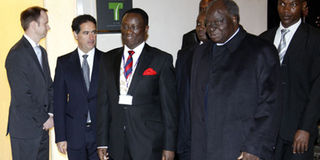Kibaki wants resolute Somalia action

President Kibaki is received by the Kenyan High Commissioner to the UK Ephraim Ngare on arrival in London. He called for resolute international efforts in dealing with the security and humanitarian crisis in Somalia February 23, 2012. PPS
President Kibaki has called for resolute international efforts in dealing with the security and humanitarian crisis in Somalia.
Speaking Thursday during the London Conference on Somalia at Lancaster House, President Kibaki said a new and more dangerous theatre for terrorist action has emerged in Somalia following the involvement of Al-Qaeda elements in the Al-Shabaab insurgency.
He said Kenya had recently arrested a number of foreign fighters within the Al Shabaab and this made it clear that the militia were part of Al-Qaeda international terrorist network.
President Kibaki said this development should serve as a wake up call to the international community to enhance security measures in order to counter terrorism worldwide.
He lauded the efforts of United Nations Security Council towards strengthening the operations of the African Union Mission in Somalia.
“Kenya welcomes the United Nations Security Council Resolution No. 2036 of 2012 that has reviewed the Amisom future operations in Somalia, as recommended by the African Union," said President Kibaki.
The President, however, noted that the resolution does not provide for a maritime component, which is critical to the eventual success of the campaign in Somalia as well as the fight against piracy and international terrorism.
He underscored the need for the development of a Somalia national security force.
“There is need to support the setting up of a nucleus Somali armed force. This demands that the international community facilitates the immediate integration of the various trained units into the TFG force. Such action will also enable the TFG to take effective control of the liberated areas."
President Kibaki said the humanitarian crisis was a burden to Kenya.
“It is adversely impacting our political and socio-economic dynamics. It is posing growing and serious security threats to Kenya and the region” the President said.
“The refugee camps in Kenya are overcrowded, have caused huge environmental degradation, have led to growing tensions with host populations and are infiltrated by extremists. This is the reality of the humanitarian and security crisis that Kenya continues to bear”.
President Kibaki urged the Conference to map out a firm and durable solution, including the return of refugees to their home country.
“Therefore, the humanitarian actors should now take advantage of the areas secured from the Al-Shabaab to resettle these populations. This is a matter of utmost urgency as Kenya can no longer continue carrying the burden occasioned by this situation,” President Kibaki said.
He restated Kenya’s continued commitment to ensuring peace in Somalia.
“We facilitated the peace process that led to the formation of the Transitional Federal Government in 2005. And we continue to bear the burden of hosting the largest population of Somalis outside their country, including some 630,000 refugees in the Dadaab camps, and an even larger number spread across the country."
President Kibaki hailed Uganda, Burundi, Ethiopia and Djibouti for their contribution and called on other African countries that have made their offers to assist Somalia to fulfill their pledges.
At the same time, Kenya did not get all it wanted in the Somalia resolution approved on Wednesday by the United Nations Security Council, but “overall we are satisfied” with the initiative, UN Ambassador Macharia Kamau said on Thursday.
The council's agreement to incorporate more than 4,000 Kenyan troops into the Africa Union Mission in Somalia (Amisom) represents a major achievement for Kenyan diplomacy.
The “rehatting” of the forces taking part in "Operation Linda Nchi" will save Kenya billions of shillings. The cost of sustaining Kenyan troops in Somalia will henceforth be shared primarily by the United States, the European Union and the United Nations.
The resolution expanding Amisom's strength does not, however, provide the $10 million in funding for all the equipment Kenya had hoped to receive for four Kenyan Navy vessels now operating off the Somalia coast.
Susan Rice, the US ambassador to the UN, expressed regret during Wednesday Security Council meeting that the resolution did not include full support for Amisom's maritime capabilities.
Ambassador Kamau told the Nation that Kenya is “disappointed” by that outcome.
“Quarantining the coastline of Somalia is critical to the success of the mission,” he said.
But British UN Ambassador Mark Lyall Grant told reporters following the council's action that the resolution does cover payment for the crews of the four Kenyan ships as well as the fuel for operating them.
“It is only the ancillary costs, in terms of wear and tear of the boats, that will not be included,” Ambassador Grant said.
Kenya will now seek to negotiate on a bilateral basis for the material its Navy needs in order to guard the coast of southern Somalia, Ambassador Kamau added.




